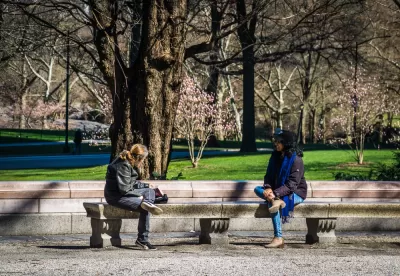An interview with Michael Berkowitz, former executive director of 100 Resilient Cities, finds a path to the light at the end of the tunnel.

Michael Berkowitz, former executive director of the nonprofit consultancy 100 Resilient Cities, speaks with Laura Bliss at CityLab for ideas about "how communities will survive the aftermath, as well as for opportunities to strengthen resilience now in the face of social and economic disruption."
According to Berkowitz, cities should be "linking various objectives together" to ensure that specific interventions strengthen the city across multiple areas. That's a key for all forms of resilience, according to Berkowitz, not just the kind of resilience necessary in response to the COVID-19 pandemic. For examples of the kind of governance he recommends, Berkowitz includes New York state, now the epicenter of the pandemic in the United States, where state and regional policies have driven the response, while mayors, like New York Mayor Bill de Blasio have taken the back seat.
Berkowitz also takes a position in the debate about the benefits and risks of density in a time of pandemic, as has been frequently discussed in the media in recent weeks, and says that, eventually, when cities reopen, density will benefit a recovery. In Berkowitz's words:
And when that next phase hits, that’s when we’ll see benefits of urban resilience — of neighbors checking in on each other, strong neighborhood institutions, diverse economies, good governance. Those things will pay off in ways that will let us rebound from this situation and hopefully let us build stronger communities.
The interview continues to touch on current opportunities to prepare for the recovery, including opportunities at the hyper-local level.
FULL STORY: What a Coronavirus Recovery Could Look Like

Alabama: Trump Terminates Settlements for Black Communities Harmed By Raw Sewage
Trump deemed the landmark civil rights agreement “illegal DEI and environmental justice policy.”

Study: Maui’s Plan to Convert Vacation Rentals to Long-Term Housing Could Cause Nearly $1 Billion Economic Loss
The plan would reduce visitor accommodation by 25% resulting in 1,900 jobs lost.

Why Should We Subsidize Public Transportation?
Many public transit agencies face financial stress due to rising costs, declining fare revenue, and declining subsidies. Transit advocates must provide a strong business case for increasing public transit funding.

Wind Energy on the Rise Despite Federal Policy Reversal
The Trump administration is revoking federal support for renewable energy, but demand for new projects continues unabated.

Passengers Flock to Caltrain After Electrification
The new electric trains are running faster and more reliably, leading to strong ridership growth on the Bay Area rail system.

Texas Churches Rally Behind ‘Yes in God’s Back Yard’ Legislation
Religious leaders want the state to reduce zoning regulations to streamline leasing church-owned land to housing developers.
Urban Design for Planners 1: Software Tools
This six-course series explores essential urban design concepts using open source software and equips planners with the tools they need to participate fully in the urban design process.
Planning for Universal Design
Learn the tools for implementing Universal Design in planning regulations.
Caltrans
Smith Gee Studio
Institute for Housing and Urban Development Studies (IHS)
City of Grandview
Harvard GSD Executive Education
Toledo-Lucas County Plan Commissions
Salt Lake City
NYU Wagner Graduate School of Public Service





























